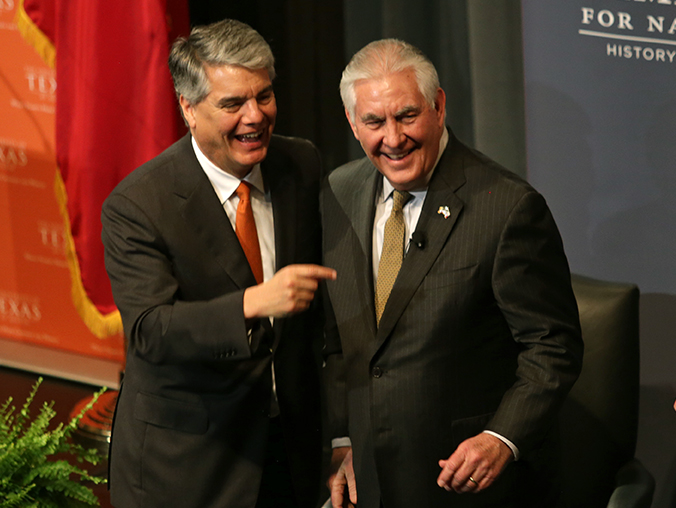Secretary of State Rex Tillerson, a UT alumnus, acknowledged the country’s role in supporting drug cartels and laid out the nation’s plans to root out corruption in Latin America during a visit to campus on Thursday.
Tillerson’s visit was the first leg of a seven-day trip to Mexico, Peru, Argentina, Jamaica and Colombia. During his speech at the Blanton Museum of Art, Tillerson outlined the U.S.’s commitment to supporting democratic values in Latin America.
Tillerson said many countries in Latin America, such as Venezuela and Peru, have untapped energy resources. To help the region, Tillerson said the U.S. plans to invest billions to tap into those resources.
“By building out a more flexible and robust energy system in our hemisphere, we can power economies with affordable energy,” Tillerson said to an audience of nearly 300. “We can lift more people out of poverty. We can make our hemisphere the undisputed seat of global energy supply.”
By helping people out of poverty, Tillerson said crime and especially the power of transnational criminal organizations, such as drug cartels, will be severely weakened in the region.
“We must address security and development issues side by side,” Tillerson said. “You cannot expect to have one without the other.”
At the same time, Tillerson also recognized that the U.S. has long been a source of strength for drug cartels.
“The opioid epidemic we are facing in this country is a clear and tragic representation of how interconnected our hemisphere truly is,” Tillerson said. “Violence and drugs do not stop at our southern border.”
Several students in attendance were given the opportunity to ask Tillerson questions. Patricia Zavala, Latin American studies and public affairs graduate student, asked about what can be done to combat government corruption in Latin America.
Tillerson responded by saying the U.S. plans to do its best to support fair judicial systems and law enforcement in Latin American countries. However, Zavala, whose studies focus on Latin America and public affairs, said she feels policies such as this may have unintentionally undermined the economies and stability of countries in the region.
“The U.S. would need to step away from meddling so much in the governments, in their elections, in their development,” Zavala said. “The U.S. should take more of a hands-off approach to corruption.”
At the end of Tillerson’s visit, William Inboden, executive director of the Clements Center, asked for the secretary’s thoughts on what he called Texas’ “most threatening border problem” — Oklahoma.
“We just need to get in place a visa program for the Red River, and we just won’t issue any visas to the Oklahoma football team,” Tillerson said in response.
Abigail Griffin, a Plan II senior, said she appreciated Tillerson’s visit to UT because it humanized him by showing that anyone, regardless of who they become, can return to UT and joke about how UT is still better than the University of Oklahoma.
“It reminds you that they’re just people,” said Griffin, who also interned at the Department of State under former Secretary of State John Kerry. “You always bleed orange once you’ve been here, and I think it’s really cool to see that in prominent individuals.”





















